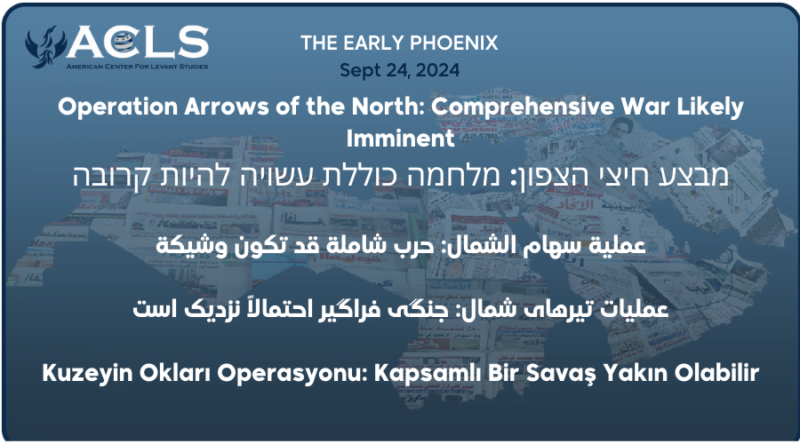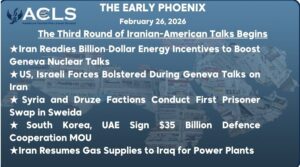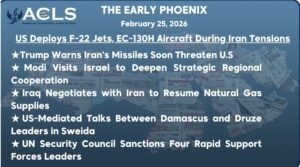
September 24, 2024
★ ISRAEL-HEZBOLLAH WAR
-
Hezbollah Munitions Destroyed by 1,600 Israeli Strikes
Israel began the official war phase 1 with Hezbollah 24 hours ago. The IDF carried out 1,600 sorties on Hezbollah targets, many of which were long-range cruise missiles, rockets with large warheads and drones. In one case, Israeli intelligence revealed pictures of a long-range rocket mounted on a hydraulic launcher and sitting in the attack of a Lebanese family’s home, leading to recorded on video secondary explosions.
-
Israel Hacks Lebanese Radio Stations in Unprecedented Cyber Operation
Israel hacked Lebanese radio stations, broadcasting evacuation warnings to residents. This operation marks a significant escalation in Israel’s ability to penetrate Lebanon’s communication infrastructure. The Israeli broadcasts, voiced in Arabic, instructed civilians to leave areas believed to house Hezbollah’s weapon caches. Following these radio hacks, residents of southern Lebanon also reported receiving mass texts and phone calls with similar warnings.
-
Netanyahu Urges Lebanese Civilians to Leave Hezbollah-Controlled Areas
Prime Minister Benjamin Netanyahu directly addressed Lebanese citizens, stating that Israel’s war is not against them but against Hezbollah. He accused Hezbollah of using civilians as human shields by placing rockets and missiles in residential areas. Netanyahu urged civilians to take the Israeli Defense Forces’ warnings seriously and evacuate danger zones to avoid further casualties. He emphasized that Israel’s military actions are focused on dismantling Hezbollah’s weaponry to protect Israeli citizens, while urging the Lebanese to leave the affected areas until it is safe to return after the military operation concludes.
-
Deadliest Day In Lebanon 500 Fatalities, 1,645 Injured
The airstrikes have primarily targeted southern Lebanon, including the city of Tyre, with additional attacks reported near the Syrian border in western Damascus. By the end of the day, the Lebanese Ministry of Health reported 500 fatalities and 1,645 injuries, warning that the death toll could rise further. This marked one of the deadliest days in the ongoing conflict. Hezbollah-affiliated clerics Abu Ali Riya and Seyed Muhammad Saleh were killed in an Israeli airstrike on the village of Tefahta. The Qassam Brigades, the military wing of Hamas, announced that Mahmoud al-Nader, one of its field commanders in southern Lebanon , was killed in an Israeli airstrike on Lebanon.
-
Hezbollah’s Third-in-Command Ali Karaki Escapes Israeli Strike
Hezbollah confirmed that its southern front commander, Ali Karaki, survived an Israeli airstrike in Beirut. The precision strike targeted Karaki, Hezbollah’s third-highest-ranking military official, in the densely populated Madi neighborhood. Initial reports suggested he was injured, but Hezbollah later clarified that he had moved to a safe location. This marks the second assassination attempt on Karaki, who previously survived an Israeli bombing in February.
-
Hezbollah’s Launch Capabilities Show Notable Reduction
The IDF reported that Hezbollah had retaliated with a barrage of approximately 70 rockets, including 30 launched towards Israel’s northern Galilee region, in response to the 1,600 rockets fired by Israel. Israeli defense systems intercepted many of the rockets, while others landed in open areas. Overnight, the IDF conducted dozens of attacks across Lebanon, focusing on the Beqaa, Baalbek, and Harmel regions. Airstrikes targeted vehicles, with reports of a double-digit number of fatalities. Hezbollah launched six separate rocket attacks on Israeli military bases and facilities, including the Megiddo military base in Afula and the Ramat David airfield. Other targets included a military airfield and an explosives factory in Zichron Yaakov. Defense Minister Yoav Gallant stated that Hezbollah’s 20-year weapons buildup is being dismantled.
-
Thousands Displaced as Violence Escalates Across Lebanon
Thousands of civilians have been displaced, with schools across Lebanon opening to shelter those fleeing the violence. Entire neighborhoods have been destroyed by the strikes. Many of Nasrallah’s supporters spent the night in a car, stuck in standing traffic, after hastily packing their belongings and their families to flee southern Lebanon. Mass displacement is occurring in southern Lebanon, with many civilians fleeing toward Syria through the Qusayr area. In Beirut, tensions rose in Ain El Remmaneh as residents of the Christian suburb clashed with displaced Shiites from Hezbollah-controlled areas. The Lebanese army was deployed to restore order.
-
Israeli Cabinet Discusses Possible Ground Offensive in Lebanon
The Israeli security cabinet convened for four hours to discuss ongoing military operations against Hezbollah. Ministers were briefed on the progress of the “Arrows of the North” campaign, which aims to dismantle Hezbollah’s military capabilities in Lebanon. Discussions included the potential for further military escalation and a broader confrontation. The briefings emphasized Israel’s readiness to continue operations if Hezbollah does not withdraw. According to The Economist, Israel is preparing for a ground offensive to occupy a buffer zone along the Lebanon border, with combat units training in northern military bases. Mobilization has not yet begun.
=========
★ IRAN
-
Pezeshkian Accuses American Media of Misrepresenting Iran
Iran is retreating from confrontations and leaning towards arranging its political cards with the United States and the West, according to Lebanese political analysts. Tehran Times reported that Iranian President Masoud Pezeshkian met with senior American media managers in New York, where he criticized Western media for projecting a negative and Islamophobic image of Iran. Pezeshkian stressed Iran’s commitment to regional cooperation and peaceful coexistence, stating that the country does not seek unrest. He also called for domestic unity within Iran while fostering positive relations with neighboring states. Given that Tehran Times is an Iranian government outlet, its account of the meeting and Pezeshkian’s statements should be viewed with skepticism due to potential bias.
-
Zarif Warns of Retaliation, Calls for Gaza Peace
In an interview with NBC News, Iran’s Mohammad Javad Zarif stated that Iran has the right to retaliate for the assassination of Ismail Haniyeh in Tehran, committed by Israel, and will do so at a time of its choosing. He emphasized that Iran seeks peace, not war, but will defend itself if necessary. Zarif also referenced stalled nuclear deal negotiations, attributing the fallout to the U.S. withdrawal under Trump. Meanwhile, Iranian officials, including Abbas Araghchi, signaled openness to restarting nuclear talks during the UN General Assembly.
-
Iran Signals Willingness to Restart Nuclear Talks, Criticizes Israel
Iranian Foreign Minister Abbas Araqchi stated that Tehran is ready to restart nuclear negotiations if other signatories to the JCPOA are prepared. Speaking in New York, Araqchi ruled out a meeting with U.S. officials but condemned Israel’s actions in Gaza and Lebanon, calling them “blind terrorism.” He emphasized Iran’s desire to strengthen ties with Saudi Arabia and urged Gulf nations to unite against Israeli aggression. Araqchi also called for the withdrawal of foreign military forces from Syria and expressed support for resolving regional conflicts diplomatically.
-
Iran and Russia Use Ai to Amplify Anti-U.S. Campaigns
U.S. intelligence officials reported that Russia, Iran, and China are utilizing Ai tools to influence the American public ahead of the November election. Russia, in particular, has targeted Vice President Kamala Harris, using Ai-generated content, including altered videos and fake news. The Office of the Director of National Intelligence (ODNI) and FBI highlighted Russia’s aggressive campaign to undermine Harris’s credibility. Iran and China are also using Ai to promote content that exacerbates domestic divisions, with Iran focusing on Gaza, while China emphasizes issues like drug use and immigration.
======
★ The Region
-
Erdogan and Pezeshkian Hold A Closed-Door Meeting In NY
In a closed-door meeting with Iranian President Masoud Pezeshkian during the UN General Assembly in New York, Erdogan discussed Israel’s attacks on Palestine and Lebanon. He stressed the international community’s responsibility to condemn Israeli violence based on international law and human rights. Erdogan also highlighted Türkiye’s efforts to provide humanitarian aid to Palestinian civilians, particularly in Gaza, where he said Israeli massacres are occurring.
-
Turkish Foreign Minister Criticizes UN Leadership, Calls for Reform
Turkish Foreign Minister Hakan Fidan stated that the United Nations has failed to display necessary leadership to address current global challenges. Speaking at the UN Summit of the Future in New York, Fidan emphasized the need for comprehensive reform, particularly in the Security Council, to create a more inclusive and effective multilateral system. He echoed President Erdogan’s call for reform, criticizing the UN’s inability to address international crises such as the Israeli war on Gaza. Fidan also advocated for improving global financial structures and reducing the digital gap between developed and least developed countries.
-
Egypt Urges UN Security Council to Act Over Israel-Lebanon Escalation
Egypt’s foreign ministry called on the United Nations Security Council and international powers to immediately intervene in response to Israel’s escalating military operations in Lebanon.
-
Saudi FM Calls for Urgent UN Reforms at Future Summit
Saudi Foreign Minister Prince Faisal bin Farhan emphasized the urgent need for reforming the United Nations system to address global challenges undermining peace and security. Speaking at the “Future Summit” during the 79th UN General Assembly, Prince Faisal highlighted the UN’s failure to resolve humanitarian crises, particularly in Palestine, and to hold Israeli authorities accountable.
-
GCC Foreign Ministers Coordinate on Regional and International Issues
The foreign ministers of Gulf Cooperation Council (GCC) countries held a coordination meeting on the sidelines of the 79th United Nations General Assembly in New York. Chaired by Qatar‘s Prime Minister and Foreign Minister Sheikh Mohammed bin Abdulrahman Al Thani, the meeting focused on aligning efforts concerning key regional and international issues. Discussions included strategic relations between the GCC and global blocs, along with reviewing current developments. GCC Secretary-General Jassim Al-Badawi emphasized the Gulf nations’ growing role in global diplomacy and the importance of strengthening international partnerships to support peace and security initiatives.
-
Biden Names UAE as Key U.S. Defense Partner After India
President Joe Biden officially designated the UAE as a major defense partner following a meeting with UAE President Mohammed bin Zayed Al Nahyan at the White House. This designation allows for enhanced military cooperation, previously only granted to India. US says Harris, UAE leader, discussed the Gaza war and hostage talks during White House meeting.
============
Previous editions:
Israel Confronts Iran’s Multiple Fronts Iraq, Yemen, Hezbollah
Related Studies:
TV7 Israel: September 23, 2024- Interview with Joel Rayburn and Mike Doran
Deep Dive Featuring Hudson Institute-Israel At War Update



